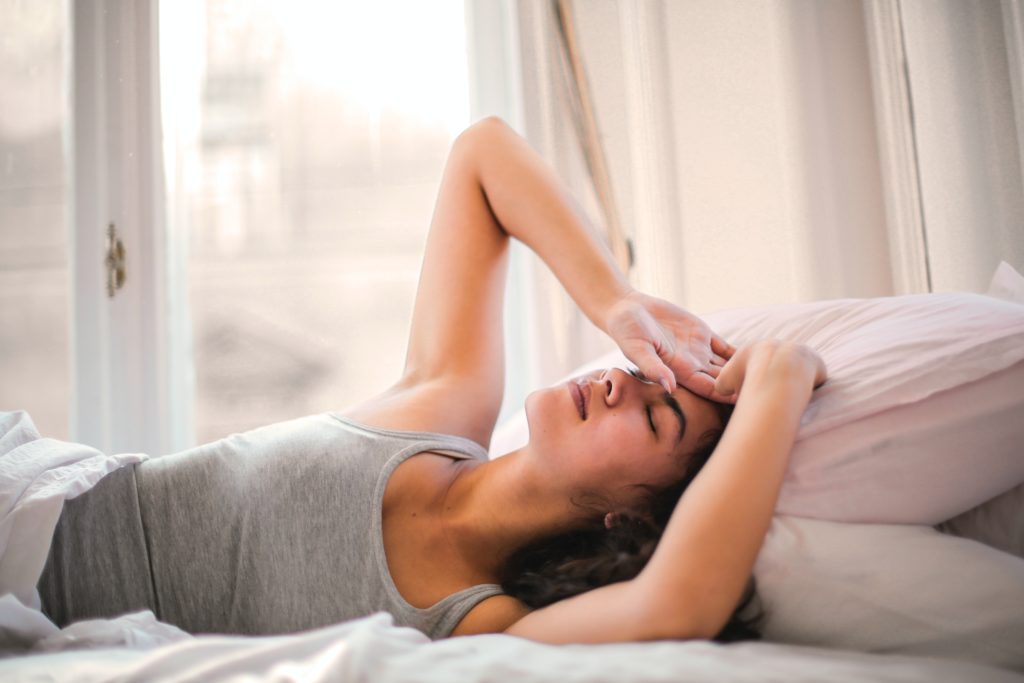Night sweats are always uncomfortable, often unpredictable, and an invariably frustrating symptom of menopause that 50 to 75% of women suffer with. Currently, medical science doesn’t know the precise cause of these vexing vasomotor episodes. However, new theories connecting night sweats (and hot flushes) with certain chronic health conditions may hold clues as to why night sweats occur, as well as how best to manage them.
Stress and Its Many Health Effects
Though the sharp decrease in estrogen is a major cause, it doesn’t explain the phenomenon of night sweats entirely. Another contributing factor being investigated is chronic stress. Elevated cortisol levels associated with stress have been found to impair the temperature-regulating centers in the brain. This leads to rapid fluctuations in blood flow and decreased ability to distribute heat appropriately throughout the body.
Stress also causes elevated blood pressure and impairs blood sugar control. These underlying conditions cause additional detrimental effects on blood flow that may contribute to the development of night sweats or make them more severe.
Additionally, night sweats are closely associated with elevated triglyceride and LDL levels and lower HDL levels, and are now viewed as a sign of increased risk of heart disease, type 2 diabetes, metabolic syndrome, liver disease, and even osteoporosis.
Symptom Severity Is Significant
With regards to the cardiovascular connection, studies show that severity of night sweats is a key component. Infrequent night sweats are not associated with increased underlying risk for cardiovascular disease, while frequent or severe night sweats are. Similarly, night sweats that first appear either in early perimenopause or post-menopause ( 1 year from your last period) are associated with increased cardiovascular disease risk.
Conventional Management
- Hormone Replacement Therapy
The standard conventional prescription medical treatment for night sweats is hormone replacement therapy (HRT). This is a proven method for alleviating night sweats, but it may also increase risk for cardiovascular disease, blood clots, and breast and uterine cancers.
Using progesterone in combination with estrogen reduces these risks, but doesn’t eliminate them, so if you are struggling with night sweats and are otherwise at low risk for all of these conditions your doctor may recommend HRT. Also, you may be a candidate for HRT if you are younger than 60 or within 10 years of the beginning of menopause. Since night sweats and other menopause symptoms tend to be more severe in the early phases of menopause many doctors tend to reserve the use of HRT for women in these groups.
- Progesterone
Oral progesterone, by itself, is a viable option for managing night sweats and improving sleep and has been found to reduce overall vasomotor symptoms by 55% in perimenopausal, menopausal, and post-menopausal women.
Alternative Management/ Supplements
- Supplement with Sage
Salvia officinalis, aka common or culinary sage can provide safe, effective relief for menopausal night sweats, according to a clinical trial. Sage contains polyphenol molecules that are able to loosely bind to estrogen receptors, giving them mild estrogenic effects. These types of compounds, known as phytoestrogens, provide some of estrogen’s benefits without causing the detrimental effects of excess estrogen exposure, such as increasing cancer risk.
In the study, participants took 300 mg of sage extract per day for three months. At the 10- and 12-week marks, most reported significant reduction in night sweats. Sage also improved several other menopause symptoms, such as heart palpitations, depression, anxiety, muscle and joint pain, and low libido.
If you are looking to try a natural supplement that contains sage to help reduce or eliminate your night sweats and hot flashes, shop Mia Vita Hot Flash Relief supplement.
- Other Phytoestrogen Sources
Soybeans contain the phytoestrogen compounds genistein and daidzen, which can be effective and, in a case study, reduced one woman’s severe night sweats by 70% per night.
The herb red clover contains compounds that are converted to denistein and daidezein by intestinal bacteria.
On a cautionary note, high intake of some phytoestrogens may increase breast cancer risk in those with a family history or who carry the BRCA gene.
- Exercise: A Little Daytime Sweating Can Prevent Night Sweats
It’s a worthwhile swap and an effective way to manage night sweats, according to a group of women who participated in a recent study. The previously sedentary volunteers performed moderate-intensity exercise of their choice 3 to 5 days per week for six months at a level that raised their heart rate to where they would notice their pulse and feel an increase in body temperature. Most participants reported a marked decrease in night sweats and improvements in other menopausal symptoms, such as poor sleep and mood swings. One participant reported having gone two weeks without night sweats; another slept more deeply since her sleep was uninterrupted by night sweats.
Though nights sweats aren’t yet fully understood they’re manageable through both conventional and alternative methods. Their connection to other chronic conditions means that the earlier you can start, in terms of guarding your stress levels and cardiovascular health, the better you may fare through menopause and beyond.
